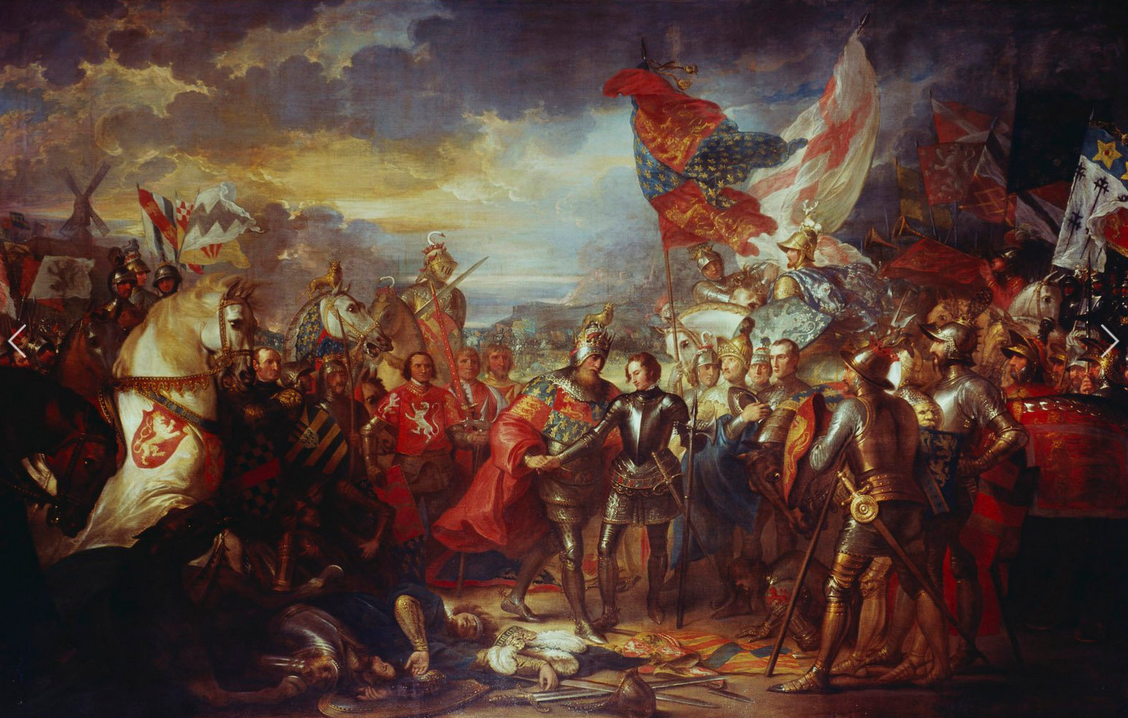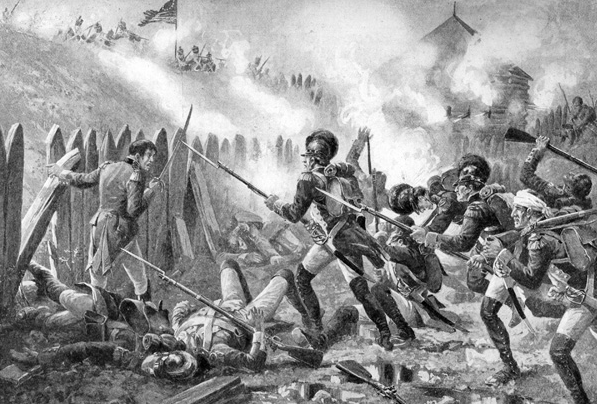Editor’s note: The following is extracted from An Introduction to the History of Western Europe, by James Harvey Robinson (published 1902)
Extent of the king of England’s realms before Edward I (1272–1307)
…. The English kings who preceded Edward I had ruled over only a portion of the island of Great Britain. To the west of their kingdom lay the mountainous district of Wales, inhabited by that remnant of the original Britons which the German invaders had been unable to conquer. To the north of England was the kingdom of Scotland, which was quite independent except for an occasional vague recognition on the part of its rulers of the English kings as their feudal superiors. Edward I, however, succeeded in conquering Wales permanently and Scotland temporarily.
The Welsh and their bards
For centuries a border warfare had been carried on between the English and the Welsh. William the Conqueror had found it necessary to establish a chain of earldoms on the Welsh frontier, and Chester, Shrewsbury, and Monmouth became the outposts of the Normans. While the raids of the Welsh constantly provoked the English kings to invade Wales, no permanent conquest was possible, for the enemy retreated into the mountains about Snowdon and the English soldiers were left to starve in the wild regions into which they had ventured. The long and successful resistance which the Welsh made against the English must be attributed not only to their inaccessible retreats but also to the patriotic inspiration of their bards. These fondly believed that their people would sometime reconquer the whole of England, which they had possessed before the coming of the Angles and Saxons.
Edward I conquers Wales
The title of ‘Prince of Wales’
When Edward I came to the throne he demanded that Llewelyn, Prince of Wales, as the head of the Welsh clans was called, should do him homage. Llewelyn, who was a man of ability and energy, refused the king’s summons, and Edward marched into Wales. Two campaigns were necessary before the Welsh finally succumbed. Llewelyn was killed (1282), and with him expired the independence of the Welsh people. Edward divided the country into shires and introduced English laws and customs, and his policy of conciliation was so successful that there was but a single rising in the country for a whole century. He later presented his son to the Welsh as their prince, and from that time down to the present the title of “Prince of Wales” has usually been conferred upon the heir to the English throne.
Scotland before Edward I
The Highlands and Lowlands
The conquest of Scotland proved a far more difficult matter than that of Wales. The early history of the kingdom of Scotland is a complicated one. When the Angles and Saxons landed in Britain, a great part of the mountainous region north of the Firth of Forth was inhabited by a Celtic tribe, the Picts. There was, however, on the west coast a little kingdom of the Irish Celts, who were then called Scots. By the opening of the tenth century the Picts had accepted the king of the Scots as their ruler, and the annalists begin to refer to the highland region as the land of the Scots. As time went on the English kings found it to their advantage to grant to the Scottish rulers certain border districts, including the Lowlands, between the river Tweed and the Firth of Forth. This region was English in race and speech, while the Celts in the Highlands spoke, and still speak, Gaelic.
Character of the inhabitants of the Lowlands
It was very important in the history of Scotland that its kings chose to dwell in the Lowlands rather than in the Highlands, and made Edinburgh, with its fortress, their chief town. With the coming of William the Conqueror many Englishmen, and also a number of discontented Norman nobles, fled across the border to the Lowlands of Scotland, and founded some of the great families, like those of Balliol and Bruce, who later fought for Scottish liberty. During the twelfth and thirteenth centuries the country, especially in the south, developed rapidly under the influence of the neighboring Anglo-Norman civilization, and the towns increased in size and importance.
Edward intervenes in Scotch affairs
Alliance between Scotland and France
It was not until the time of Edward I that the long series of troubles between England and Scotland began. The death of the last representative of the old line of Scotch kings in 1290 was followed by the appearance of a number of claimants to the crown. In order to avoid civil war, Edward was asked to decide who should be king. He agreed to make the decision on condition that the one whom he selected should hold Scotland as a fief from the English king. This arrangement was adopted, and the crown was given to Robert Balliol. But Edward unwisely made demands upon the Scots which aroused their anger, and their king renounced his homage to the king of England. The Scotch, moreover, formed an alliance with Edward’s enemy, Philip the Fair of France; thenceforth, in all the difficulties between England and France, the English kings had always to reckon with the disaffected Scotch, who were glad to aid England’s enemies.
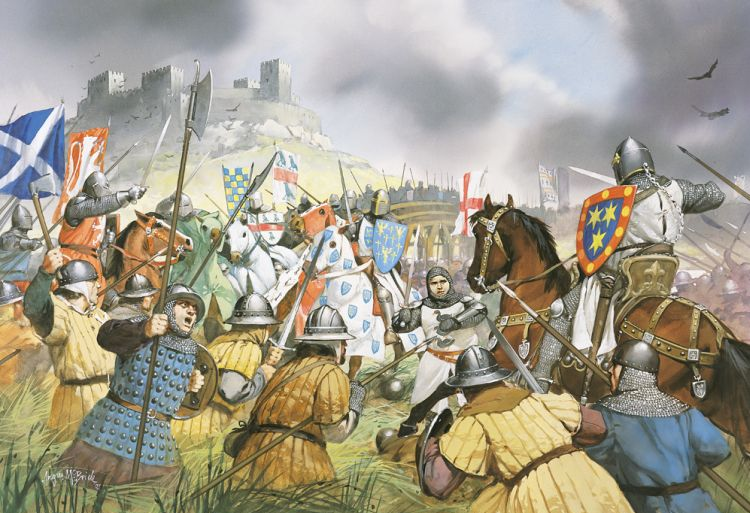
Edward attempts to incorporate Scotland with England
Edward marched in person against the Scotch (1296) and speedily put down what he regarded as a rebellion. He declared that Balliol had forfeited his fief through treason, and that consequently the English king had become the immediate lord of the Scotch nobles, whom he forced to do him homage. He emphasized his claim by carrying off the famous Stone of Scone, upon which the kings of Scotland had been crowned for ages. Continued resistance led Edward to attempt to incorporate Scotland with England in the same way that he had treated Wales. This was the beginning of three hundred years of intermittent war between England and Scotland, which ended only when a Scotch king, James VI, succeeded to the English throne in 1603 as James I.
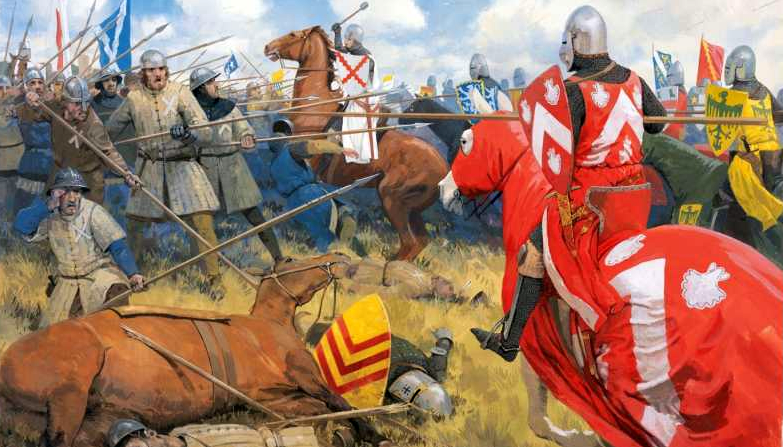
Scotland gains its independence under Robert Bruce
Battle of Bannockburn, 1314
That Scotland was able to maintain her independence was mainly due to Robert Bruce, a national hero who succeeded in bringing both the nobility and the people under his leadership. Edward I died, old and worn out, in 1307, when on his way north to put down a rising under Bruce, and left the task of dealing with the Scotch to his incompetent son, Edward II. The Scotch acknowledged Bruce as their king and decisively defeated Edward II in the great battle of Bannockburn, the most famous conflict in Scottish history. Nevertheless, the English refused to acknowledge the independence of Scotland until forced to do so in 1328.
The Scottish nation differs from the English
In the course of their struggles with England the Scotch people of the Lowlands had become more closely welded together, and the independence of Scotland, although it caused much bloodshed, first and last, served to develop certain permanent differences between the little Scotch nation and the rest of the English race. The peculiarities of the people north of the Tweed have been made familiar by the writings of gifted Scotchmen like Burns, Scott, and Stevenson.
Growth of the power of Parliament
Edward II’s numerous enemies took advantage of his weakness to bring about his downfall, but it is noteworthy that they worked through Parliament and in that way strengthened that fundamental national institution. We have seen how Edward I called representatives of the townspeople, as well as the nobles and prelates, to the Model Parliament of 1295. This important innovation was formally ratified by his son, who solemnly promised that all questions relating to his realm and its people should be settled in parliaments in which the commons should be included. Thereafter no statute could be legally passed without their consent. In 1327 Parliament showed its power by forcing Edward II to abdicate in favor of his son, and thereby established the principle that the representatives of the nation might even go so far as to depose their ruler, should he show himself clearly unfit for his high duties. About this time Parliament began to meet in two distinct divisions, which later became the House of Lords and the House of Commons. In modern times this form of legislative assembly has been imitated by most of the countries of Europe.
Cause of the Hundred Years’ War
The so-called Hundred Years’ War, which we must now review, was a long but frequently interrupted series of conflicts between the English and the French kings. It began in the following manner. The king of England, through John’s misconduct, had lost Normandy and other portions of the great Plantagenet realm on the continent. He still retained, however, the extensive duchy of Guienne, for which he did homage to the king of France, whose most powerful vassal he was. This arrangement was bound to produce constant difficulty, especially as the French kings were, as we have discovered, bent upon destroying as fast as possible the influence of their vassals, so that the royal power should everywhere take the place of that of the feudal lords. It was obviously out of the question for the king of England meekly to permit the French monarch to extend his control directly over the people of Guienne, and yet this was the constant aim of Philip the Fair and his successors.
The French succession in 1328
The inevitable struggle between England and France was rendered the more serious by the claim made by Edward III that he was himself the rightful king of France. He based his pretensions upon the fact that his mother Isabella was the daughter of Philip the Fair. Philip, who died in 1314, had been followed by his three sons in succession, none of whom had left a male heir, so that the direct male line of the Capetians was extinguished in 1328. The lawyers thereupon declared that it was a venerable law in France that no woman should succeed to the throne. The principle was also asserted that a woman could not even transmit the crown to her son. Consequently Edward III appeared to be definitely excluded, and Philip VI of Valois, a nephew of Philip the Fair, became king.
Edward III claims the French crown
At first Edward III, who was a mere boy in 1328, appeared to recognize the propriety of this settlement and did qualified homage to Philip VI for Guienne. But when it became apparent later that Philip was not only encroaching upon Edward’s prerogatives in Guienne but had sent French troops to aid the Scotch, the English king bethought him of his neglected claim to the French crown.
The Flemish towns
The advantage of publicly declaring himself the rightful king of France was increased by the attitude of the flourishing towns of Flanders. Philip VI had assisted the count of Flanders in a bitter struggle to prevent the towns from establishing their independence. Consequently the Flemish burghers now announced their willingness to desert Philip and acknowledge and aid Edward as their king.
Commercial relations between the Flemish towns and England
English wool
Flanders at this period was the most important trading and manufacturing country in western Europe. Ghent was a great manufacturing town, like Manchester to-day, and Bruges a busy port, like modern Antwerp or Liverpool. All this prosperity was largely dependent upon England, for it was from there that the Flemish manufacturers procured the fine, long wool which they wove on their looms into cloth and spun into yarn. In 1336 the count of Flanders, perhaps at Philip’s suggestion, ordered the imprisonment of all the Englishmen in Flanders. Edward promptly retaliated by prohibiting the export of wool from England and the importation of cloth. At the same time he protected and encouraged the Flemish artisans who had emigrated across the Channel and were carrying on their industry in the county of Norfolk.
It is clear, then, that the Flemish burghers had good reason for wishing Edward to become their king, so that their relations with England might not be broken off. They did their part in inducing him to undertake the conquest of France, and (in 1340) we find him adding the fleur de lis of France to the lions of the English royal arms.
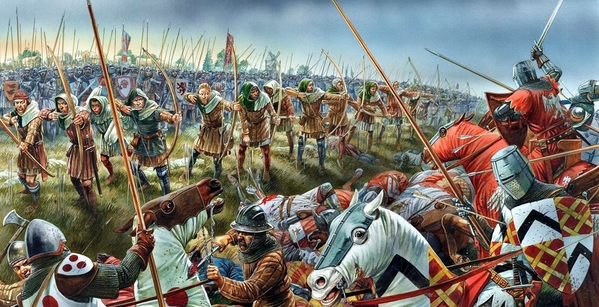
Edward III invades France, 1346
The English victory at the battle of Crécy, 1346
Edward did not invade France for some years, but his sailors destroyed the French fleet and began to show themselves able to maintain their king’s claim to be lord of the English seas upon every side. In 1346 Edward himself landed in Normandy, devastated the country, and marched up the Seine almost to Paris, but was then obliged to retreat northward before a large army which Philip had collected. Edward made a halt at Crécy, and here one of the most celebrated battles of history took place. It taught the world a great lesson in warfare by proving once more, as the battle of Bannockburn had already done, that foot soldiers, properly armed and trained to act in concert, could defeat the feudal cavaliers in spite of their lances and heavy armor. The proud mounted knights of France performed prodigies of valor, each for himself, but they did not act together and could not hold their ground against the deadly shower of arrows poured into their midst from the long bows of the English archers. The flower of French chivalry was routed with terrible slaughter by the serried ranks of the humble English foot soldiers. It was at Crécy that Edward’s son, the Black Prince,—so named from his black armor,—won his spurs.
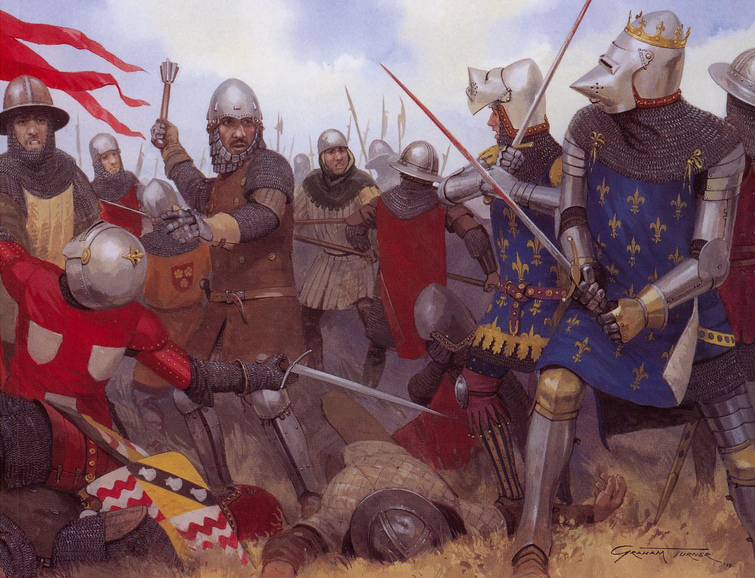
The English take Calais
The Black Prince wins a second great victory at Poitiers, 1356
After this great victory the English king proceeded to lay siege to Calais, the French coast town nearest England. This he took, drove out a great part of the inhabitants, and substituted Englishmen for them. The town remained subject to England for two centuries. When the war was renewed the Black Prince, now at the height of his fame, was able to deal the enemy a still more crushing blow than at Crécy. He again put the French knights to flight in the battle of Poitiers; he even captured the French king, John, and carried him off to London.
The Estates General attempt to control the king and reform the government
The French quite properly attributed the signal disasters of Crécy and Poitiers to the inefficiency of their king and his advisers. Accordingly, after the second defeat, the Estates General, which had been summoned to approve the raising of more money, attempted to take matters into their own hands. The representatives of the towns, whom Philip the Fair had first called in, were on this occasion more numerous than the members of the clergy and nobility. A great list of reforms was drawn up, which provided, among other things, that the Estates should meet regularly whether summoned by the king or not, and that the collection and expenditure of the public revenue should be no longer entirely under the control of the king but should be supervised by the representatives of the people. The city of Paris rose in support of the revolutionary Estates, but the violence of its allies discredited rather than helped the movement, and France was soon glad to accept the unrestricted rule of its king once more.
Contrast between the position of the Estates General and the English Parliament
This unsuccessful attempt to reform the French government is interesting in two ways. In the first place, there was much in the aims of the reformers and in the conduct of the Paris mob that suggests the great successful French revolution of 1789, which at last fundamentally modified the organization of the state. In the second place, the history of the Estates forms a curious contrast to that of the English Parliament, which was laying the foundation of its later power during this very period. While the French king occasionally summoned the Estates when he needed money, he did so only in order that their approbation of new taxes might make it easier to collect them. He never admitted that he had not the right to levy taxes if he wished without consulting his subjects. In England, on the other hand, the kings ever since the time of Edward I had repeatedly agreed that no new taxes should be imposed without the consent of Parliament. Edward II had gone farther and accepted the representatives of the people as his advisers in all important matters touching the welfare of the realm. While the French Estates gradually sank into insignificance, the English Parliament soon learned to grant no money until the king had redressed the grievances which it pointed out, and thus it insured its influence over the king’s policy.
Treaty of Bretigny, 1360
Edward III found it impossible to conquer France in spite of the victories of the Black Prince and the capture of John. He was glad in 1360 to sign the treaty of Bretigny, in which he not only renounced his pretensions to the French crown but agreed to say no more of the old claims of his family to Normandy and the Plantagenet provinces north of the Loire. In return for these concessions he received, in full sovereignty and without any feudal obligations to the king of France, Poitou, Guienne, Gascony, and the town of Calais, amounting to about one third of the territory of France.
England loses most of its French territory before the death of Edward III
The promising peace of Bretigny was however soon broken. The Black Prince, to whom the government of Guienne was delegated by his father, levied such heavy taxes that he quickly alienated the hearts of a people naturally drawn to France rather than to England. When the sagacious Charles V of France (1364–1380) undertook to reconquer the territory which his father had ceded to England, he met with no determined opposition; Edward III was getting old and his warlike son, the Black Prince, had fallen mortally ill. So when Edward died in 1377 nothing remained to the English king except Calais and a strip of land from Bordeaux southward.
Miserable condition of France
For a generation after the death of Edward III the war with France was almost discontinued. France had suffered a great deal more than England. In the first place, all the fighting had been done on her side of the Channel, and in the second place, the soldiers who found themselves without occupation after the treaty of Bretigny had wandered about in bands maltreating and plundering the people. Petrarch, who visited France at this period, tells us that he could not believe that this was the same kingdom which he had once seen so rich and flourishing. “Nothing presented itself to my eyes but fearful solitude and extreme poverty, uncultivated land and houses in ruins. Even about Paris there were everywhere signs of fire and destruction. The streets were deserted; the roads overgrown with weeds.”
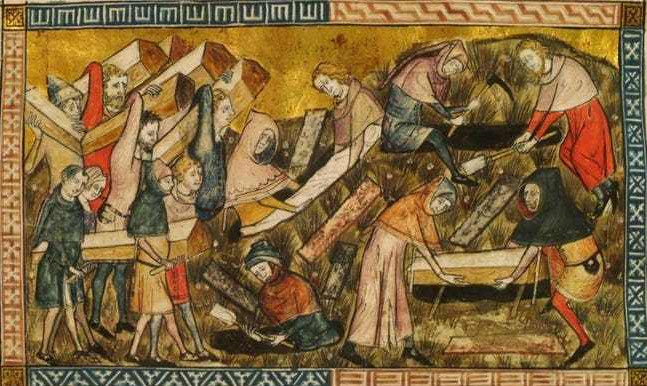
The bubonic plague of 1348–1349, commonly called the ‘black death’
The horrors of war had been increased by the deadly bubonic plague which appeared in Europe early in 1348. In April it had reached Florence; by August it was devastating France and Germany; it then spread over England from the southwest northward, attacking every part of the country during the year 1349. This disease, like other terrible epidemics, such as smallpox and cholera, came from Asia. Those who were stricken with it usually died in two or three days. It is impossible to tell what proportion of the population perished. Reports of the time say that in one part of France but one tenth of the people survived, in another but one sixteenth; and that for a long time five hundred bodies were carried from the great hospital of Paris every day. A careful estimate shows that in England toward one half of the population died. At the Abbey of Newenham only the abbot and two monks were left alive out of twenty-six. There were constant complaints that certain lands were no longer of any value to their lords because the tenants were all dead.
Conditions of English labor
In England the growing discontent among the agricultural classes may be ascribed partly to the results of the great pestilence and partly to the new taxes which were levied in order to prolong the disastrous war with France. Up to this time the majority of those who cultivated the land belonged to some particular manor, paid stated dues to their lord, and performed definite services for him. Hitherto there had been relatively few farm hands who might be hired and who sought employment anywhere that they could get it. The black death, by greatly decreasing the number of laborers, raised wages and served to increase the importance of the unattached laborer. Consequently he not only demanded higher wages than ever before, but readily deserted one employer when another offered him more money.
The Statutes of Laborers issued in 1351 and following years
This appeared very shocking to those who were accustomed to the traditional rates of payment; and the government undertook to keep down wages by prohibiting laborers from asking more than had been customary during the years that preceded the pestilence. Every laborer, when offered work at the established wages, was ordered to accept it on pain of imprisonment. The first “Statute of Laborers” was issued in 1351; but apparently it was not obeyed and similar laws were enacted from time to time for a century. Nevertheless complaints continued that serfs and laborers persisted in demanding “outrageous and excessive hire.” This seems to indicate that the efforts of Parliament to interfere with the law of supply and demand were unsuccessful.
Breaking up of the mediæval manors in England
The old manor system was breaking up. Many of the laboring class in the country no longer held land as serfs but moved from place to place and made a living by working for wages. The villain, as the serf was called in England, began to regard the dues which he had been accustomed to pay to his lord as unjust. A petition to Parliament in 1377 asserts that the villains are refusing to pay their customary services to their lords or to acknowledge the obligations which they owe as serfs.
Causes of discontent among the English peasants
‘The Vision of Piers Ploughman’
The discontent was becoming general. We see it reflected in a remarkable poem of the time, “The Vision of Piers Ploughman,” in which the unfortunate position of the peasant is vividly portrayed. This is only the most notable example of a great number of pamphlets, some in prose and some in bad verse, which were calculated to make the people more discontented than ever. The efforts to enforce the provisions of the Statutes of Laborers had undoubtedly produced much friction between the landlords and their employees. A new form of taxation also caused much irritation. A general poll tax, which was to be paid by every one above sixteen years of age, was established in 1379 and another one in the following year to meet the expenses of the hopeless French war which was now being conducted by incapable and highly unpopular ministers.
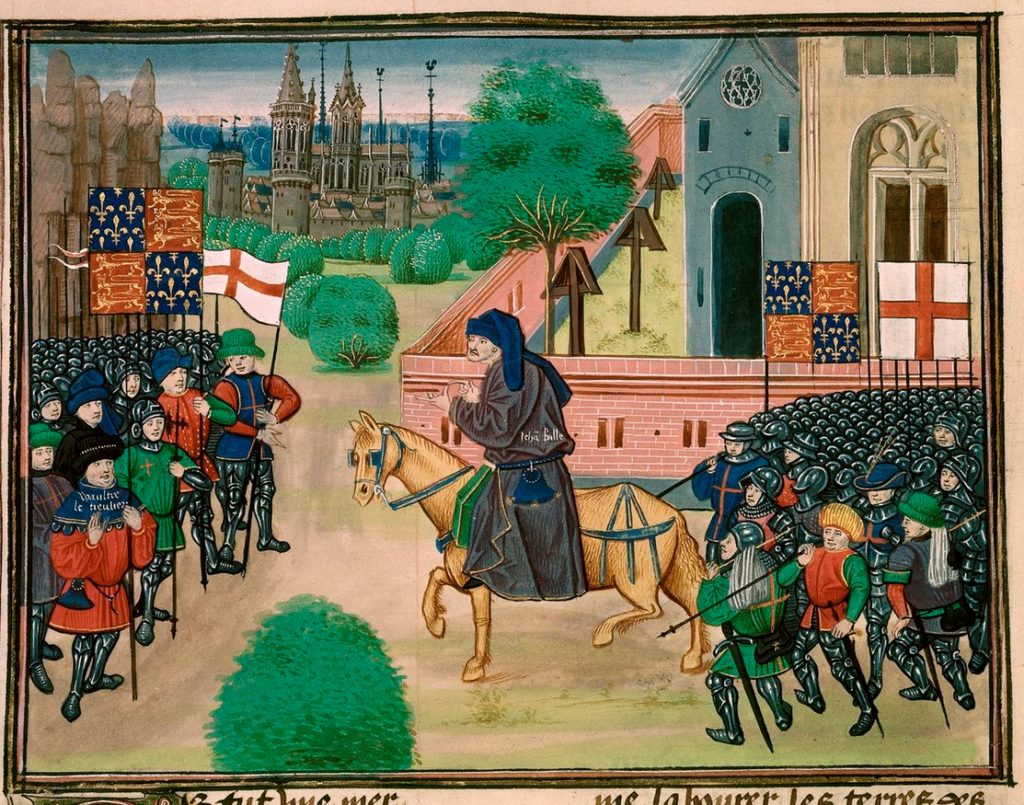
The peasant revolt of 1381
In 1381 rioting began among the peasants in Kent and Essex, and several bodies of the insurgents determined to march upon London. As they passed along the road their ranks were swelled by discontented villagers and by many of the poorer workingmen from the towns. Soon the revolt spread all through southern and eastern England. The peasants burned some of the houses of the gentry and of the rich ecclesiastics, and took particular pains to see that the lists for the collection of the hated poll tax were destroyed, as well as the registers kept by the various lords enumerating the obligations of their serfs. The gates of London were opened to the insurgents by sympathizers within the walls, and several of the king’s officers were seized and put to death. Some of the simple people imagined that they might induce the boy king, Richard II, to become their leader. He had no idea of aiding them; he went out, however, to meet them and induced them to disperse by promising that he would abolish serfdom.
Final disappearance of serfdom in England
Although the king did not keep his promise, serfdom decayed rapidly. It became more and more common for the serf to pay his dues to the lord in money instead of working for him, and in this way he lost one of the chief characteristics of a serf. The landlord then either hired men to cultivate the fields which he reserved for his own use or rented the land to tenants. These tenants were not in a position to force their fellow-tenants on the manor to pay the full dues which had formerly been exacted by the lord. Sixty or seventy years after the Peasants’ War the English rural population had in one way or another become free men, and serfs had practically disappeared.
Deposition of Richard II and accession of Henry IV of Lancaster, 1399–1413
Henry V claims the French crown, 1414
The war with France had, as we have seen, almost ceased for a generation after the death of Edward III. The young son of the Black Prince, Richard II, who succeeded his grandfather on the throne, was controlled by the great noblemen whose rivalries fill much space in the annals of England. He was finally forced to abdicate in 1399. Henry IV, of the powerful house of Lancaster, was recognized as king in spite of the fact that he had less claim than another descendant of Edward III, who was, however, a mere boy. Henry IV’s uncertain title may have made him less enterprising than Edward III; at any rate, it was left for his son, Henry V (1413–1422), to continue the French war. The conditions in France were such as to encourage the new claim which Henry V made to the French crown in 1414.
Civil war in France between the houses of Burgundy and Orleans
The able French king, Charles V, who had delivered his country for a time from the English invaders, had been followed in 1380 by Charles VI, who soon lost his mind. The right to govern France consequently became a matter of dispute among the insane king’s uncles and other relations. The country was divided between two great factions, one of which was headed by the powerful duke of Burgundy, who was building up a new state between France and Germany, and the other by the duke of Orleans. In 1407 the duke of Orleans was brutally murdered by order of the duke of Burgundy,—a by no means uncommon way at that time of disposing of one’s enemies in both France and England. This led to a prolonged civil war between the two parties, and saved England from an attack which the duke of Orleans had been planning.

